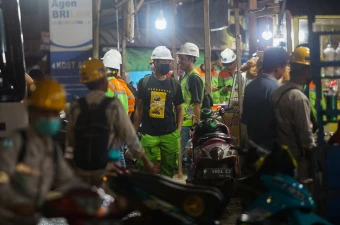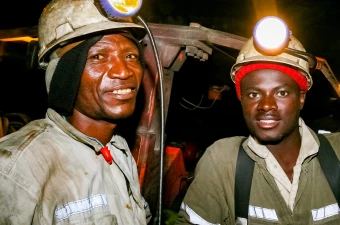A Colombian delegation composed of representatives of the Labor and Mining & Energy Ministries, accompanied by coal mining trade unions, are visiting the Netherlands from 2 to 6 December.
The global energy transition presents a challenge for all. In the previous century, the Netherlands and other European countries constituted some of the largest extractors and users of coal, thus becoming historically responsible for a large share of cumulative greenhouse gas emissions. In that process, much valuable experience from the closure of the mines was acquired. This was and has been a process that significantly affected mine workers and their communities.
Since the 1960s, when the Netherlands and other countries in the European Union started closing down their coal mines, coal for power generation has been sourced from countries such as Colombia, one of the world's largest coal exporters. However, as renewable energy sources have continuously eclipsed coal fired power generation, coal imports are being gradually discontinued, in alignment with climate agreements. Consequently, Colombia, which exports up to 90% of extracted coal, mainly to OECD countries such as the Netherlands, must now undertake efforts for an economic, labor and energy transition.
What the Netherlands and other European countries were able to do in the course of decades, the Colombia mining regions Cesar and Guajira, in the north of the country have now to do in a matter of few years, and in extreme cases, months. All this, in regions of the country that have endured intense violence associated to decades of internal armed conflict and which have some of the highest poverty levels.
A joint Colombian delegation, led by the Ministry of Labor, the Ministry of Mines & Energy and Colombian unions, will visit the Netherlands from 2 to 6 December. The delegation will also travel to meet the EU in Brussels to gain insights from our experiences, but also discuss potential avenues to enhance cooperation.
Historical responsibility for climate crisis
The longstanding use of coal, first from domestic extraction and afterward imported from Colombia, by the Netherlands and the European Union imposes a historical responsibility on the current climate crisis. Accordingly, it should compel coal importing and emissions-intensive countries such as the Netherlands, to facilitate just transition, especially in those regions from where coal has been sourced over the past decades to supply local power demand.
The purpose of the visit is twofold:
- to gain insights into the mine closures and economic diversification in former coal-dependent regions such as Limburg.
- to engage in discussions regarding proposals for collaboration and investments in a new economy to gradually move beyond today’s coal-dependent regional economies.
Support of Transition Funding
One proposal is to fund these investments by agreeing on channel at least $1 per ton of imported coal from importing companies, as well as a similar figure from governments that will persist in purchasing coal until 2040 (e.g. via ODA instruments), towards the different transition funds established by the Colombian government to implement actions such as labor reskilling and retraining or the deployment of renewable energy sources, amongst other economic alternatives.
Plan and central questions
The Colombian delegation composed of representatives of the Labor and Mining & Energy Ministries, accompanied by coal mining trade unions is visiting from December 2 to 6.
During this visit, they will engage in discussions with the Dutch government, members of the House of Representatives, and representatives from Dutch and European energy companies. A comprehensive itinerary includes a visit to Limburg, the former Dutch mining region in the south of the Netherlands.
Subsequently, the delegation will visit Brussels for discussions with the European Commission and members of the European Parliament
Central questions during the visit include:
How can we guarantee that the transition to sustainable energy is equitable, preventing any individuals or regions from being left behind?
- How can we ensure decent work and re-skilling opportunities for workers to adapt to the new circumstances?
- What opportunities for redevelopment exist that could provide the coal region with a renewed perspective?
Innovative collaborative initiatives are being discussed and developed among the Colombian government, trade unions, corporations, and European and Dutch partners to extract lessons from historical events, such as the mine closures in the south of the Netherlands and connect these insights to contemporary knowledge and experience.
Publication date 02 12 2024


